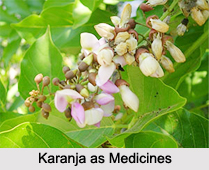 Karanja is an important Ayurvedic medicine, used predominantly in skin diseases. Karanja twigs were used as toothbrush in ancient times. Its botanical name is Pongamia glabra. The tree appears to be common in, and well known all over India.
Karanja is an important Ayurvedic medicine, used predominantly in skin diseases. Karanja twigs were used as toothbrush in ancient times. Its botanical name is Pongamia glabra. The tree appears to be common in, and well known all over India.
Health Benefits of Karanja
The seeds are much used as an external application in skin diseases. The expressed oil of the seeds is used in these diseases as well as in rheumatism. A poultice of the leaves is applied to ulcers infested with worms.
Dose of Karanja in Medicine
The seeds of Pongamia glabra, Cassia Tora (chakramarda) and the root of Aplotaxis auriculata (kushtha), are rubbed into a paste with cow"s urine, and applied to eruptive skin diseases.
Prithisara Taila: Take the expressed oil of the seeds of Pongamia glabra one seer, Kanjika 8 tolas, roots of Plumbago Zeylanica (chitraka), Neriurn odorum (Karavira), Vitex Negundo (nirgundi), aconite and the seeds of Corchorus olitorius (nadika), 8 tolas each, in the form of a paste made with Kanjika. Mix them together and warm in the sun. This oil is said to be useful in various sorts of skin diseases, ulcers etc.
Tiktadya Ghrita: Take the leaves and fruits of Pongamia Glabra, root of Picrorrhiza Kurroa, (katuki), wax, turmeric, liquorice root, leaves of Trichosanthes dioica (patala), Aganosma caryophyllata (malati) and Azadirachta Indica (neem) equal parts, in all one seer. Beat them into a paste and boil with 4 seers of clarified butter and 16 seers of water in the usual manner. This preparation is used as an ointment in unhealthy ulcerations and wounds.
This article is a stub. You can enrich by adding more information to it. Send your Write Up to content@indianetzone.com
Related Articles
Ayurveda
Ayurveda Medication
Elements of Ayurveda
Concepts of Ayurveda
Ancient Literature of Ayurveda




















